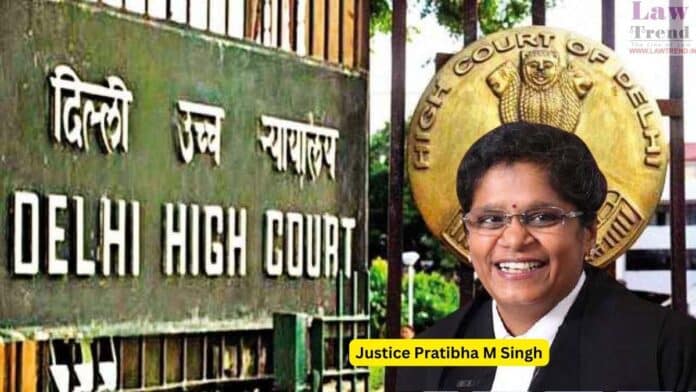The Delhi High Court has constituted a five-member committee for the implementation of the National Rare Disease Policy-2021, including procurement and “indigenisation” of therapies and drugs for patients who are mostly children.
The members of the National Rare Diseases Committee would include secretary, Union health ministry, or one of his nominee, director general of the Indian Council for Medical Research (ICMR), the Drug Controller General of India, and Dr Madhulika Kabra and Dr Nikhil Tandon from AIIMS-Delhi, the court ordered.
It was dealing with a batch of petitions concerning the treatment of several children suffering from rare diseases.
Justice Prathiba M Singh said urgent steps in close coordination among the medical community, therapy providers and government agencies were needed as under the present framework, Centres for Excellence were not centrally coordinated, leading to lack of timely availability and adequate therapies for patients with rare diseases.
The court noted that while the government was keen on finding solutions to deal with rare diseases, the lack of data and awareness and the unavailability of treatment were the foremost challenges in devising a framework for treatment.
It also observed that prohibitively high prices of drugs and therapies also hindered easy and timely access to medicines.
“In order to implement the policy in an efficient manner and to ensure that the benefits of the policy reach the ultimate patients of rare disease who are the beneficiaries of the policy, it is deemed appropriate to constitute the National Rare Diseases’ Committee,” the court said in an order released on Thursday.
The committee’s mandate would broadly be to take all steps needed for the implementation of the 2021 policy, it said.
The petitioners before court are children suffering from several rare diseases, including Duchenne Muscular Dystrophy (DMD) and Mucopolysaccharidosis-II or MPS-II (Hunter Syndrome).
They have sought a direction to the Centre to provide them uninterrupted and free of cost treatment as the therapy for these diseases is very expensive.
DMD, one of the various forms of muscular dystrophy, is a rare genetic disease that affects boys almost exclusively and causes progressive weakness. MPS II is also a rare disease that is passed on in families and it mainly affects boys and their bodies cannot break down a kind of sugar that builds bones, skin, tendons and other tissues.
The court noted that 517 DMD patients were enrolled with the All India Institute of Medical Sciences (AIIMS) here, out of which 312 were amenable to treatment.
It said 189 patients were registered with the AIIMS here for spinal muscular atrophy and 166 others were enrolled for lysosomal storage disorders, gaucher, MPS and other rare diseases.
The court said the national committee would look into the immediate needs of certain petitioners whose treatment has been stopped due to lack of funding and it would be free to contact providers or manufacturers of DMD therapies to ensure immediate commencement of providing adequate doses for such patients.
The court directed that the first meeting of the Committee shall be held between May 17 and May 21.
“It is realised that there is a need for some urgent steps to be taken in close coordination between the medical community, the providers of therapies for rare diseases and the governmental agencies,” the court said in a recent order
Under the current framework, the Centres for Excellence are not centrally coordinated, leading to lack of timely availability and adequate therapies for patients with rare diseases who are mostly children,” stated the court in the order.
“The mandate of the committee shall include (i) Procurement of therapies and drugs and creation of associated logistical framework for administration of treatment for patients with rare diseases; (ii) Recommending necessary steps for the indigenisation of therapies, medicines for rare diseases and identify the manner in which the same can be made accessible to the lakhs of patients who, as per the policy, are suffering from rare diseases,” the court said.
It said the committee would undertake a periodic review of the National Rare Disease Policy and recommend to the health ministry changes needed to the policy, if deemed necessary. It can also consult people or organisations as invitees to committee meetings to work for the overall objective of the policy, the court said.
The court said a meeting should be held among Hanugen Therapeutics Private Limited, the Biotechnology Industry Research assistance Council and representatives of the ICMR in the week starting May 22 for chalking out a time table for the DMD clinical trials in terms of approved protocols.
Also Read
In December 2021, the court had directed the AIIMS to start treatment of eligible children suffering from rare diseases and asked the Centre to provide funds, saying it is painful to see children in this situation, and they cannot be made to suffer.
Earlier that year, it had passed a slew of directions in connection with the treatment of people with rare diseases, including notification of the National Health Policy for Rare Diseases by March 31, 2021.
The directions also included setting up of a national consortium for research, development and therapeutics, a rare diseases committee at the AIIMS and a fund for such ailments.
Recently, the court had said it cannot turn a blind eye to the medical condition of 40 children suffering from rare diseases and that the rare diseases committee at the AIIMS here was “expected to act with alacrity in all these matters and not take matters in a cavalier manner”.
The court will hear the matter next on May 29.




